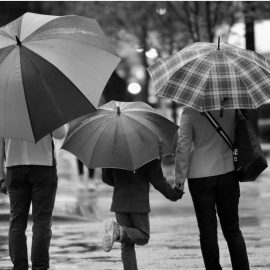

This article gives you a glimpse of what you can learn with Shortform. Shortform has the world’s best guides to 1000+ nonfiction books, plus other resources to help you accelerate your learning.
Want to learn faster and get smarter? Sign up for a free trial here .
What is crippling depression? How does it impact your daily life?
Crippling depression is another term for clinical depression, a debilitating illness that can severely impact your life. It can cause persistent feelings of sadness, problems at work, sleep disturbances, changes in appetite, and difficulty concentrating. At worst, it can lead to suicide.
Keep reading to find out the causes of crippling depression and some helpful tips for coping.
Causes of Crippling Depression
Often, the experience of depression is described as being “crippling,” because it can make even the simplest of tasks extremely difficult and can impair your ability to live a normal life. Although it might feel hopeless, there are things that can help.
The causes of crippling depression—and depression in general—have long been debated. Likely, any given person’s depression might be caused by a combination of the factors described below:
Biological Causes
The “medical model” of mental illness is the idea that a serotonin imbalance in the brain causes symptoms of depression and anxiety, with no influence from the outside environment. Serotonin is one of several chemicals in the brain called neurotransmitters, which are chemical messengers that relay information from one cell to another. In the medical model, serotonin is the chemical that makes us feel happy, and people get depressed when their brains don’t produce enough serotonin on their own. Through this lens, depression is a medical disease that pops up randomly, much like cancer.
However, that story is only half-true: Depression isn’t about willpower or laziness (and is certainly not a choice), but the debilitating effects of depression are not the result of a simple “chemical imbalance.”
There are some very real biological factors at play in the development of crippling depression and its effects on the body: namely, neuroplasticity and genetics.
Neuroplasticity
Neuroplasticity is your brain’s ability to change its structure in response to the environment. Each part of the brain works a bit like a muscle—the more you use it, the bigger and stronger it gets.
This means that, for most people, depression creates changes in the brain—not the other way around. Social, psychological, and environmental disconnections deprive the emotion centers of the brain of the experiences they need to make us feel happy; if those disconnections persist, that unhappiness grows into depression, which makes it even more difficult to establish those beneficial connections and ultimately results in further changes in the emotion centers of the brain.
The good news is, neuroplasticity also means that depression isn’t a static state, because no one is born with a brain that is fundamentally, structurally depressed. If brains can change to become depressed, they can also change back to not being depressed.
Genetics
Studies show that depression is roughly 37% inherited, meaning genetics are a big piece of the mental illness puzzle. However, they’re not the biggest piece: Roughly 63% of the basis for depression comes from somewhere outside of biology.
As such, if you’re suffering from depression, it might be due to your genetics.
The Biosocial Model
According to Johann Hari, author of Lost Connections, the sheer number of people taking medications for mental health hints at a deeper issue: If depression is a purely biological illness caused by a random malfunction in the brain, how is it that so many people’s brains are going biologically haywire at the same time? As it turns out, depression is not just about your biology.
Today, most scientists talk about depression and other mental illnesses using the arguably more accurate biopsychosocial model, or the idea that mental illness is caused by a combination of three factors: biology (“bio”), psychological history (“psycho”), and social environment (“social”). In other words, biology is only part of the problem—which means a drug that treats biological factors can only be part of the solution.
Psychological Causes
As well as biological factors, it’s also thought depression could be the result of psychological factors:
Negative Thought Patterns
The cognitive model proposes that dysfunctional thinking is common to all psychological disturbances. In this way, mental illnesses, including crippling depression and anxiety may be considered thinking disorders.
The patient has automatic dysfunctional self-talk that influences behavior negatively; the behavior is then interpreted in a negatively biased way, leading to worse thinking. This reinforces itself into a vicious cycle.
- Example: A patient wants to try something new. She thinks, “you’re definitely going to fail, you’re not good at anything.” → Anxious about failing, the patient declines to try the new activity. → She then thinks, “I told you, you can’t get anything right—you’re worthless.”
Past Trauma
Another potential cause of depression is past trauma.
Childhood trauma is one of the most reliable predictors of adult depression according to the Adverse Childhood Experiences (ACE) Study. The study’s results show that people who had experienced ACEs were more likely to suffer health problems, including depression, and the more ACEs you have, the more likely you are to experience depression.
Social Causes
Social factors might also cause depression. Here are some examples:
Financial Problems
Losing the ability to imagine and plan for the future due to financial instability can contribute to crippling depression. The rise of the “gig economy” means that stable, guaranteed employment is no longer the norm. More people than ever are working for hourly wages with no contract and no guarantee that they’ll still have a job next week, let alone next year. Without that security, it becomes impossible to picture the future—and easy to get depressed.
Loneliness
Another factor that can cause depression is disconnection from meaningful relationships with other people. The reason why this causes depression is rooted deep in human evolutionary history: Millions of years ago, the only way for early humans to avoid becoming a tasty snack for a predator was to band together into tribes. People who felt miserably depressed when they wandered off on their own were more motivated to stick with the tribe, so they were more likely than loners to survive long enough to pass on their genes.
Now, humans are more socially isolated than ever before. Studies show that most American adults have zero close confidants. Living with other people or in a big city doesn’t change that because solving loneliness isn’t just about gaining physical proximity to others: It’s about developing a mutually meaningful connection with someone else.
Low Social Status
Some scientists think that crippling depression is a stress response from our evolutionary history, linked to a feeling of low social status. Researchers discovered this effect by studying the social hierarchies of baboons. For male baboons, in particular, competition for the top spots is brutal. To avoid being ripped apart, low-status baboons make themselves as non-threatening as possible by lowering themselves physically as a way to say, “You win. Please don’t hurt me.” Their posture and behavior mimic those of severely depressed people.
Common life hardships like financial insecurity, lack of control over your daily life, and fractured relationships can make us feel that we’re “worse” or lower-status than other people. So, we react with the same submission response.
This is something psychologist Jordan Peterson looks at in his book 12 Rules for Life.
Unrewarding Work
In 2011 and 2012, a Gallup poll showed that only 13% of adults are “enthusiastic about and committed to” their work. The three main reasons for this are a lack of control over the job, low professional status, and a disconnect between effort and reward (for example, if working harder doesn’t translate to more money or status).
This can be a big contributor towards experiencing depression.
At the same time, work hours are expanding—the “nine to five” is now more of a “seven to seven”—which means that many people spend the majority of their time working a job they don’t like.
Disconnection From Intrinsic Motivation
Many people persevere in a depressing job because it pays well. That’s an example of extrinsic motivation—doing something just as a means to an end. On the other hand, intrinsic motivation is what drives you to do things purely for the joy of them. Studies show that achieving intrinsic goals increases happiness, but achieving extrinsic goals doesn’t. In fact, over time, it does the opposite: Dozens of studies from all over the world show that the more extrinsically motivated you are, the more likely you are to develop crippling depression and anxiety.
Social Media
Social media can be harmful to mental health. Scholars have noted that social media and excess screen time are highly correlated with depression, anxiety, and self-harm among young people.
Social media provides you with a window into the lives of everyone in your peer group. More than ever before everyone can see what their friends are up to at any given moment, which has negative consequences for emotional well-being.
Disconnection From Nature
Many of us live in cities, far from the natural world. When we’re disconnected from the natural world in this way, we often become caught up in our own problems and lose sight of the greater sense of meaning in our lives. In a sense, humans living in dense cities are similar to unhappy wild animals in captivity, and we’re similarly distressed: Rates of all forms of mental illness, including depression, are higher in cities than in rural areas, and people in urban areas with more green space (like parks) have better mental health than people in urban areas without access to green space. Scientists have three theories to explain this:
- Modern, sedentary lifestyles don’t meet our evolutionary needs. Humans are animals, and like all animals, our bodies were designed to move.
- We have an innate preference for natural landscapes. Scientists call this “biophilia,” and it explains why even the smallest exposure to nature can have profound effects.
- Connecting to nature breaks the grip of the ego. The pain of depression causes people to sink into themselves. But out in nature, that pain no longer seems like the biggest thing in the world because it’s so small compared to the expansive landscape.
Tips for Coping With Crippling Depression
As we’ve seen, there is strong scientific evidence for social and environmental causes of depression, like unfulfilling work, separation from nature, and a lack of control over your working life. All of this evidence points to one thing: If biology isn’t the only problem causing depression, then medication shouldn’t be the only solution to it.
Dealing with crippling depression isn’t easy, but here are some science-backed coping techniques that can help:
1. Have a Plan for Bad Days
If you’re suffering from depression, on some days you might not have the energy to focus on getting better—and that’s ok.
On particularly bad days, you could have a set routine you follow, focus on rest, and look after yourself. Here are some things you might include:
- Trying to get some sleep.
- Eating something nice.
- Having a shower, and getting into some clean clothes.
- Talking to people you feel really comfortable with, like a partner, family, or close friends.
- Canceling any unnecessary social plans.
- Getting out of the house for a walk.
- Doing something easy and fun, like watching tv, reading a book, or doing some coloring.
The main thing is to try and not put yourself under any pressure.
2. Take Medication
Although medication shouldn’t be the only line of treatment, it’s worth considering.
One of the most notable proponents of antidepressants is Dr. Peter Kramer, whose book Listening to Prozac is one of the best-selling books on antidepressants ever written. Kramer argues that antidepressants can be helpful for certain people.
As a practicing psychiatrist, Kramer has personally witnessed that those with severe or crippling depression made incredible recoveries on antidepressants. He concedes that the effects might not be as strong for moderately depressed people.
| Recommended Reading: Lost Connections For an in-depth look at why anti-depressants are not the only treatment option for people with depression, take a look at our summary of Lost Connections by journalist Johann Hari. He offers many tactics and techniques for people with depression to work out what causes it and how they can cope. In our summary you’ll learn: The history of antidepressants and the questionable science behind themWhy Amish people hardly ever get depressedHow a guaranteed income, doctor-prescribed volunteer work, and magic mushrooms could be the antidepressants of the future |
3. Try CBT Therapy
Cognitive-behavioral therapy (CBT) is a standard first line of treatment for improving mental health disorders such as depression and anxiety. CBT has been found to be as effective as medication in treating many mental disorders.
Cognitive Behavioral Therapy (CBT) is directed toward solving current problems and modifying dysfunctional thinking and behavior. Changing the underlying belief system leads to enduring behavior change.
CBT encourages the patient to:
- Recognize the negative thoughts that are happening automatically.
- Recognize the biased interpretations of their experiences.
- Examine the evidence of a situation. View their experiences from a more realistic and objective perspective.
- Example: Instead of thinking “I can’t do anything right,” patients are led to think, “I’m not good at this specific task. But I’m good at others.”
- Experiment with exposure to situations they fear to test their negative predictions.
- Reflect on their experiments to adjust their beliefs.
The cardinal question of CBT: “What was just going through my mind?”
The best way to approach CBT is to go to a licensed therapist. However, if this isn’t financially viable or isn’t something you’re ready for, you could try some exercises at home.
To find out how CBT works and to have access to some helpful CBT exercises to try at home, take a look at Shortform’s comprehensive summary of CBT: Basics and Beyond.
4. Practice Self-Care
Crippling depression can make it incredibly difficult to look after yourself. However, self-care is one of the best ways to cope with depression.
It’s important to remember that self-care isn’t selfish. Instead, it’s an essential part of looking after your well-being. Here are some self-care ideas you can try:
- Look after your physical health by exercising and eating well.
- Say no to things you don’t want to do.
- Ask others to help.
- Read a nice book (or a Shortform summary if you don’t have a lot of time!)
- Keep a journal.
- Spend some time on a hobby.
- Take a day off.
- Have a relaxing bath.
- Spend time with loved ones, friends, and pets.
- Get a massage.
For more ideas, here’s a list of 100 self-care activities to try.
5. Find Distractions
A lot of us fixate on the sadness to try to figure out what’s wrong or to understand ourselves better. But this is rumination, which, as we already know, actually increases and prolongs the feelings we’re ruminating on. It’s useful to analyze your sadness if it actually leads to concrete actions or insights that will result in positive change–but if you find yourself passively ruminating on why you’re so sad, you’re probably just reinforcing how sad you are.
Sad thoughts are automatic and often enter our minds unbidden. So scheduling pleasant distractions actively breaks up these automatic thoughts and prevents them from intruding.
It’s important that the distractions are truly pleasant. In one study, depressed people were given a list of distractions and asked to choose one, and they ended up choosing the more depressing distractions.
Here are some good distractions, that can help if you have depression:
- Read, watch TV or movies, or play video games that result in positive feelings.
- Do puzzles.
- Take a nap.
- Let yourself daydream! Plan a fantasy vacation. Where would you go? For how long? What would you do?
- Watch an exciting sporting event.
- Get yourself a treat or indulge in some sensual pleasures: aromatherapy, a massage, a hot bath, good music, or even sex.
- Help other people.
- Pray to a higher power or practice gratitude.
- Exercise is also useful for sadness. It releases endorphins and changes your physical state in the opposite way of anger: when angry, you’re in a high arousal state, and exercise can put you into a low arousal state once you finish–but when you’re sad, you’re in a low arousal state already, and the goal is to get you into a higher arousal state, which exercise does.
Some commonly used distractions have pitfalls and might be worse for you in the long run. Exercise these with caution.
- Eating is one method people use to deal with sadness, and this can spin out of control: most eating disorders originate as an attempt to deal with feelings by controlling or indulging in food.
- Alcohol and drug dependencies also usually emerge as coping methods for negative feelings, so this is also a dangerous distraction or indulgence to get your mind off feeling sad, and should be used with caution.
6. Get Out in Nature
As we explained earlier, disconnection from nature is a leading cause of depression.
Getting outside for even a short amount of time per day has some great benefits for mental health, including:
- Reduced stress.
- An effective distraction from negative thoughts.
- Creating a distraction from negative thoughts.
- Improved confidence.
7. Build Relationships With Other People
In an increasingly digital world, many of our connections are superficial and don’t allow for meaningful connections, leading to loneliness and, sometimes, crippling depression. To heal that depression, we need to build genuine relationships based on vulnerability and mutual support that restore us to our natural, healthy state as social animals living in close-knit communities.
The idea that depression is a personal issue that should be dealt with alone is a symptom of Western individualist values.
In the West, we see happiness as an individual thing, so we address it on an individual level. We engage in “self-care” and read books from the “self-help” section, but never ask for help or allow ourselves to be truly vulnerable around others.
However, in Asian countries, if you set out to make yourself happy, you’ll most likely engage in communal care because you see your happiness as intrinsically tied to the happiness of your community.
Collectivist approaches to depression actually work. Focusing on others forces your attention out of your own head and creates the mental breathing room you need to genuinely connect with a community. Depression creates an ego-centric worldview—you’re unhappy, you don’t feel good enough, you’re not getting what you need—so countering that narrative by focusing on the group is more powerful than looking for a quick fix on your own.
Case Study: The Kotti Neighborhood Protest
The power of connecting with others is evident in the example of Nuriye Cengiz, an elderly woman living in Kotti, a working-class neighborhood in Berlin. Nuriye was facing eviction because she couldn’t afford the most recent rent increase in her area. Distraught, she hung a note in her window explaining to her neighbors that she intended to kill herself before being forced out of her home. Neighbors from all different walks of life reached out and quickly recognized that their housing situation (and resulting depression) was a collective issue, not an individual one.
As a result of that realization, elderly Muslims, single mothers, teenage punks, and retired Communists banded together to call for justice for people like Nuriye in a makeshift protest camp—all under an umbrella donated by a local gay bar. Their individual experiences of depression were created by a force bigger than any one individual could fight alone, but taking action together created real change that improved everyone’s mental health, including Nuriye’s: She didn’t kill herself.
Friendship and social bonds are well-known contributors to overall happiness and life satisfaction. Here are two ways you can build relationships to cope if you have crippling depression:
- To better keep in touch, come up with a plan to contact friends more regularly. You might call one each Saturday afternoon, or set a few dates in your calendar as “check-in” days.
- Showing up looks like visiting your friend after they have a baby, or going to friends’ events. Showing up for important moments in others’ lives naturally strengthens your bonds with them.
8. Connect With Other People’s Experiences of Depression
Another way to cope with depression is to connect with other people’s experiences of it. Depression can feel very isolating, but it might help to know other people are going through the same thing and you’re not alone.
Here are some resources you can take a look at:
- You can read about people who have overcome depression and now live a fulfilling and happy life. This includes life-coach to the stars Tony Robbins, who was once severely depressed himself but now helps others to overcome depression.
- You can listen to podcasts about depression—here are some recommendations.
- You can also read books about people’s experiences with depression and how they overcame it. One great example is Eat Pray Love by Elizabeth Gilbert, which tells the story of Gilbert’s journey from crippling depression to happiness and fulfillment. If you want the key ideas from the book, read Shortform’s in-depth guide.
- Connect with an online support group of people who are going through depression. One community you can join is The Blurt Foundation.
9. Read About Depression
Sometimes the best way to overcome something is to understand it better. In the Shortform Library, we have plenty of in-depth summaries of the best books about depression and mental illness. This includes:
- Lost Connections by Johann Hari.
- 12 Rules for Life by Jordan Peterson
- The Chimp Paradox by Steve Peters.
- Untethered Soul by Michael Alan Singer.
Reading about the key ideas and concepts in these books will give you a better understanding of depression and how you can cope with it.
10. Try Mindfulness
Just five minutes of meditation a day can make you more calm and aware, and, in the long term, permanently rewire your brain for greater happiness, boost your immune system, and lower your stress. As such, it’s a great way to cope with crippling depression.
Practicing Stillness
Practicing stillness means taking the time to be still and quiet. This might take the form of praying, meditating, or just having some reflective alone time. Being still doesn’t mean clearing your mind of all thoughts—a daunting prospect for many of us. Instead, it’s about creating some quiet “space” in your mind which you can use to reflect and relax.
Practicing stillness may be uncomfortable at first. Many of us actively avoid being still because having a constant background noise of thoughts in our minds helps to drown out uncomfortable, anxious thoughts—for instance, thoughts about our flaws or things we’re dissatisfied with. However, our anxiety will never recede if we don’t bring these thoughts to the surface and address them—and forcing ourselves to be still is an important part of this process.
(Shortform note: Research suggests that various types of stillness—such as meditation, prayer, and mindfulness practice—can reduce symptoms of stress, anxiety, and even depression. To learn more about mindfulness—an increasingly popular stillness practice—read our guide to Mindfulness in Plain English, which presents mindfulness as a way to achieve mental peace and tranquility.)
Sympathetic Joy
As the name implies, sympathetic joy is the practice of feeling genuine, untainted happiness for other people. You won’t master the skill overnight, but if you’re willing to practice it, it can significantly improve your life.
To find out how to practice this, read our article about sympathetic joy.
Studies show that this kind of meditation has all kinds of mental health benefits, including reducing jealousy and increasing compassion in practical ways (which makes it easier to make the social connections everyone needs).
Even better, training your body to produce a rush of joy whenever you see someone else succeed connects you to an unlimited source of happiness. At any given moment, someone, somewhere, is feeling profoundly happy. If you seek out those people and allow yourself to share their joy, you can conjure a genuine sense of happiness even when your own life feels especially dark.
11. Look After Your Health
Looking after your physical health is a proven way to reduce your risk of depression. There are two main ways you can do this:
Exercise
Exercise is incredibly beneficial if you’re suffering from depression. It shouldn’t be the only line of treatment, but should instead be used in conjunction with the other tips on this list. Exercise releases feel-good endorphins in your brain, increases motivation, reduces stress and anxiety, and promotes focus.
An interventional study showed exercise was equivalent to antidepressants for relieving depression in people over 50 years old. But it doesn’t have to be high-intensity—even a short walk counts.
Diet
Here’s some information about the link between diet and depression:
Disclaimer: there are big confounds with associative studies between mood and diet.
- Vegetarians are often reported to be happier than omnivores. However, it’s not clear the vegetarian diet is causative—it could be that happier people tend to seek out vegetarian diets.
Reduce arachidonic acid from meat.
- This is a proinflammatory compound; produced naturally in our bodies, but enriched in animal products.
- Omnivores consume 9x more arachidonic acid than vegetarians.
- In multiple studies, omnivores that go onto a plant-based diet report significantly increased energy, better sleep, and general health.
- Highest sources of arachidonic acid: chicken and eggs have the highest level; beef, pork, and fish.
Avoid aspartame.
- An experiment showed a high-aspartame diet shows more depression and irritability and lower cognitive function
Plants are natural monoamine oxidase inhibitors.
- Phytonutrients from plant foods like apples, berries, onions, spices naturally inhibit MAO, which increases levels of neurotransmitters in the brain.
Tryptophan
- If tryptophan is important to produce serotonin, why not eat more of it?
- Tryptophan supplements led to deaths in the 1980s and subsequent bans.
- High-protein meals fail to increase tryptophan, possibly because other amino acids compete for absorption in the gut or across the blood-brain barrier.
- Carb ingestion improves mood and lowers depression.
- This might work by shunting non-tryptophan amino acids from the bloodstream into muscles, which then allows tryptophan more access into the brain.
- Seeds like sesame, sunflower, and pumpkin have high tryptophan-protein ratios.
Saffron
- Worked as well as Prozac for depression.
- Smelling diluted saffron improves anxiety for 20 minutes.
Coffee
- Suicide risk drops with increases in coffee dose.
- People who drink 6 cups of coffee daily were 80% less likely to commit suicide.
- Adding sugar to coffee negates its positive effects on mood.
Antioxidants and folate
- Free radicals and oxidative stress cause tissue damage.
- Higher levels of carotenoids reduce damage.
- Lycopene from tomatoes has the highest antioxidant activity.
- Daily eaters of tomatoes have half the odds of depression.
- Antioxidant supplements do not seem protective, while whole foods do.
12. Practice Gratitude
Another strategy for coping with depression is practicing gratitude. According to Brown, this involves frequently making time to recognize all of the things you’re grateful for. You might practice gratitude for the small things, like your breakfast this morning being delicious, or big things, like having a fulfilling job. You could keep a gratitude journal, do a regular gratitude meditation, or verbalize the things you’re grateful for.
You might feel that you’re too busy to sit around thinking about all of the things you’re grateful for. However, Brown argues that practicing gratitude doesn’t require a huge time commitment. Even if you just spend two or three minutes each day listing the things you’re grateful for, you’ll still feel the benefits of gratitude.
(Shortform note: Even if you can’ttake the time to practice gratitude every day, practicing it less frequently will likely have a positive effect. For instance, in one study, high school students who practiced gratitude only once a week felt its effects—in their case, gratitude was found to facilitate healthier eating habits and reduce negative mood.)
Research suggests that gratitude has a wide range of benefits to mental and physical health. One study found that practicing gratitude improved participants’ overall mood and the quality of their sleep.
Another study noted that practicing gratitude reduces symptoms of anxiety and depression, possibly because it encourages a mindset of self-compassion rather than self-criticism: Presumably, practicing gratitude includes being grateful for yourself, too.
Major life changes and catastrophes can happen to anyone, at any time. Reflect on how good your current reality is and recognize how you take it for granted to combat depression:
- Examine life’s fragility to adjust your perspective and see how good your life is. Do some experimenting to find your own way to reflect on life and death. For example, you might take hikes in different seasons to contemplate nature’s cycle, read books about people’s experiences with catastrophe or loss, or read obituaries.
- Create a gratitude log. Consistent gratitude helps you feel more satisfied with what you already have. Try keeping a journal or blog, or record a short video each day.
- Reframe your thinking. When you feel annoyed or overwhelmed, express gratitude for the experience. For example, instead of, “I’m tired. I don’t want to make dinner for the kids,” try, “I’m grateful that I have enough food in the house to pull together a meal.”
13. Help Others
Being generous toward your friends often gives you just as much happiness as it gives them, so it’s a great coping mechanism for crippling depression.
Some ways to cultivate a generous spirit include:
- encouraging your friends to pursue their goals;
- helping your friends make connections with others;
- helping your friends in ways that are enjoyable to you,
- such as gardening or résumé editing;
- and remembering to consider external factors that might be affecting your friends’ actions or attitudes.
We often skip over politeness because we’re too caught up in our own stresses. To work against this, be on the lookout for small matters where you can be more considerate of others.
- For example, you might give up your seat on the bus, let someone with just one item skip ahead of you in line at the store, or stop interrupting in conversation.
14. Change Your Focus
In Awaken the Giant Within, author and life coach Tony Robbins reveals the best ways to overcome a negative mindset and depression.
Robbins’s success is proof that his methods work: In less than 10 years, he went from working as a janitor, suffering from depression, being broke, feeling lonely, and being overweight to becoming a motivational speaker and drawing crowds of thousands of people.
In particular, Robbins recommends changing your “state” or your focus. This can be difficult when you’re suffering from crippling depression, but it’s worth trying.
what you choose to focus on determines how you experience life and what emotions you feel. Think of your focus like a camera lens and reality as a party: Your camera can only capture one small piece of the whole scene. If the camera focuses on a couple arguing at the party, it gives the impression that the party is full of conflict, but if you focus on a group of friends dancing and laughing, it makes it seem like the party is fun and lively.
Here are Tony Robbins’ best tips for changing your focus:
- Use empowering questions- like “what do I have to be grateful for?,” “what am I proud of right now?”
- Change your physical state by adopting a power post. This can change your emotional state dramatically.
- You can also try a “mental health diet.” Don’t indulge in any disempowering thoughts, emotions, words, questions, or metaphors for 10 consecutive days. If you notice yourself indulging in a disempowering thought or emotion, change your focus using one of the strategies we’ve discussed. If you continue to dwell on the negative for more than one or two minutes, restart the challenge the following morning.
To find out how to put these ideas into practice, read our summary of Awaken the Giant Within by Tony Robbins.
15. Get Into a Flow State
People are happy when they feel a sense of control over their thoughts and feelings. When this happens, we experience a “flow” state: We enjoy ourselves, we feel a sense of purpose and meaning, and other things don’t seem to matter as much.
For example, an artist immersed in creating a beautiful painting is experiencing flow (an “optimal experience”). It can also happen when you gain an important insight during tough times.
Doing activities that produce flow as frequently as possible has three main benefits:
- You become more self-confident because you feel skilled and capable, and you’re investing energy toward goals you’ve deemed worthwhile.
- You improve your experience of life. Even boring tasks are rewarding when made to align with your goals.
- You become a more complex individual. Complexity has two parts. First, you feel a sense of differentiation because you’ve done something that makes you feel capable and unique. Second, you feel a sense of integration: Your consciousness is well-ordered and you feel in balance with the different parts of who you are.
Finding a flow activity you can take part in regularly might be the key to coping with depression. To find out more about how to get into a flow state, read our summary of Flow by psychologist Mihaly Csikszentmihalyi.
16. Clear Up Clutter
Your surroundings have a strong bearing on your attitude, feelings of calm, and energy. One way to cope with depression is to try and declutter. You can do so in the following two ways:
- Eliminate physical clutter. This creates happiness by eliminating negative feelings like frustration, such as when you can’t find what you’re looking for. Furthermore, though you have fewer belongings in the end, they’re the belongings that you use and really like.
- Eliminate mental clutter. Tackling a list of your incomplete tasks eliminates the overwhelm and guilt that you experience when thinking about all you haven’t done.
17. Create Small Successes
Engineer a small, easy success or triumph. This will boost your mood and give you something positive to focus on, and can therefore help with the symptoms of depression:
- Make your bed in the morning to start your day with an achievement.
- Pick a chore you’ve been meaning to do or some other errand or task.
- Get dressed up or put on makeup.
- Volunteer or help others in need. In one study, this was one of the most powerful mood changers, but also the rarest.
Conclusion
Crippling depression is an incredibly difficult thing to deal with on a daily basis, it can cause severe problems at work and impair your ability to live a normal life. This article might help you understand the causes, and how to cope.
The main thing to remember is that there’s no pressure and that there’s always something new to try that might work. Rather than trying to tackle everything at once, focus on the techniques above that you’re drawn to, and slowly add them over time.
To learn more about coping with crippling depression, we recommend reading Johann Hari’s groundbreaking book Lost Connections—or, if you don’t have time, read our comprehensive summary for the key points and ideas.

Want to fast-track your learning? With Shortform, you’ll gain insights you won't find anywhere else .
Here's what you’ll get when you sign up for Shortform :
- Complicated ideas explained in simple and concise ways
- Smart analysis that connects what you’re reading to other key concepts
- Writing with zero fluff because we know how important your time is






